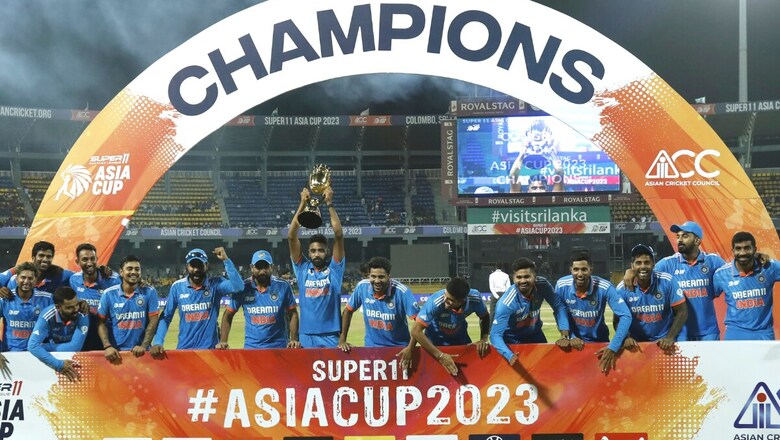
views
When the Rohit Sharma-led Indian team reached Sri Lanka in the quest of its eighth Asia Cup win, there were many niggling questions begging answers. Three of India’s star players — KL Rahul, Jasprit Bumrah and Shreyash Iyer — were returning after the long injury lay off. The batting position was not yet decided and bowlers were to perform as one unit.
Babar Azam-led Pakistan, the world’s number one ranked ODI team with a battery of world’s fastest pacers, was the clear favourite to win the title. Despite losing key players to injury, Sri Lanka was always the team to beat. And Bangladesh often in past had been the nemesis of India. Himalayan neighbour Nepal was the only minnow.
Trophy-Less for Over Half a Decade
India entered the ring as the rank outsider, with nothing much to show for the last half a decade. Its last title win was in the Asia Cup 2018 in Dubai when it defeated Bangladesh in the final by three wickets.
India’s track record in the last five years was nothing to write home about.
In the ODI World Cup in 2019, despite splendid performance on the road to the semi-final, the Indian team’s journey came to a screeching halt chasing 240 against previous edition’s runners-up New Zealand, the Indian side crumbling against the New Zealand pace battery in Manchester despite Ravindra Jadeja’s heroics with 77. After scoring an average 239/8, the Kiwis bowled India out for 221 to win by 18 runs.
Worse was the performance in the T20 World Cup 2021 hosted in the UAE, where India ended its journey in the Super 12 as they lost their first two games against Pakistan and New Zealand, respectively. Despite winning the rest of the matches, India could not reach the semis.
India, in the 2022 edition of the T20 World Cup, at least reached the semi-final, winning five of the six matches (losing only to South Africa). But in the semi-final, was routed at Adelaide Oval when England openers ran away with a 10-wicket victory in the 16th over with skipper Jos Buttler (80 not out) and Alex Hales (86 not out) dazzling with the bat.
Disastrous Start to Asia Cup
India got off to a horrendous start in their first match in Group A against arch-rival Pakistan, losing star batters Rohit Sharma (11), Virat Kohli (4) to pacer Shaheen Afridi and Shubman Gill (10) and comeback-man Shreyas Iyer (14) to pacer Rauf. Mercifully, India was saved by all-rounder Hardik Pandya and wicketkeeper-batter Ishan Kishan, who in a fabulous display of courage, determination and temperament, smashed an incredible 138-run stand to revive India’s fortunes. And the rain did the rest.
Bad Omen
It was bad omen in the next match against minnows Nepal who managed to stretch India as they managed to score respectable 230 in 48.2 overs against the famed Indian pace and spin attack. But thanks to the rain-reduced score of 147, the match was brought to safety by openers Rohit Sharma (74* off 59 balls) and Shubman Gill (67* off 62 balls). But there was no such luck for India in their last match before the final, when Bangladesh beat the Indian side 6 runs in a last-over thriller.
Stellar Performance in Between
India’s best came in the Super 4 against arch-rival Pakistan, when helped by Kuldeep Yadav’s fifer (5-25I wickets), India vanquished Pakistan by a whopping 228 runs. This was a match where the top order delivered, with Virat Kohli (122) and KL Rahul (111) putting a big score of 356 on the board, a score Pakistan faltered chasing.
In the next match against Sri Lanka, the famed Indian batting line-up was rattled by spinners Dunith Wellalage and Charith Asalanka (who shared 9 wickets between them) and India were skittled out for 213. But in a game of luck by chance, India survived a late scare and won the match by 41 runs majorly due to Kuldeep who cleaned up wickets of Sadeera Samarawickrama, Asalanka, Kasun Rajitha and Matheesha Pathirana to end with figures of 4/43.
Over to the Final
The final, like all previous matches in Sri Lanka, was played in overcast conditions, and to ensure that rain does not become a spoiler, there was a reserve day for the final. The rain god ensured that the match started 45 minutes late.
The match began with good omen for the island nation, with Sri Lankan captain Dasun Shanaka winning the toss. He decided to bat first; the wrong call in hindsight.
The Indian team (including the famous five benched in the match against Bangladesh) demolished the Lankan side in the most one-sided final the tournament has seen.
The first ball of the innings from Bumrah, an out-swinger to the right-handed Pathum Nissanka, found him edging it to third man for a single, bringing the left-handed Kusal Perera on strike. Bumrah bowled another out-swinger, this time to the left-hander that beat Perera’s bat, but the second out-swinger caught his outside edge and flew towards the wicketkeeper, who leaping to his left in front of first slip, cleaned up Perera’s wicket.
Then came Mohammed Siraj. In a spell of 16 balls, he turned the destroyer-in-chief, wreaking unprecedented havoc on the Sri Lankan batting order. Taking four wickets in one over (he missed the hattrick by a whisker), Mohammed Siraj equalled the fastest five-wicket haul in ODIs, with a 16-ball five-for record shared with, ironically, Chaminda Vaas. Sri Lanka were brought down to their knees in the first four overs of the match.
Sri Lanka were 12 for 5 after 4 overs, 30 for 6 after 9 overs, 33 for 7 after 11.2 overs, 40 for 8 after 12.2 overs, 50 for 9 after 15.1 overs and all out for 50 in 15.2 overs.
Kusal Mendis hit three boundaries before becoming Siraj’s sixth wicket and Siraj ended giving just 21 runs.
Hardik Pandya, who returned home with a wicket haul of 3-3 in just 2.2 overs, tied the Sri Lankan misery into a neat bow.
At the batting friendly Premadasa Stadium that was supposed to give spinners a field day, Indian pacers mopped up the job.
The Final Touch
India’s opening pair of Ishan Kishan and Shubman Gill successfully chased down the target of 51 with a remarkable 263 balls to spare, setting a new record. In the process, Gill also emerged as the highest scorer of the tournament with 302 runs in six matches, including a century against Bangladesh, and two fifties, one each against Pakistan and Nepal. He sat on the top spot in the run-scorers chart.
What a day it was for the Indian bowlers. While Siraj returned home with Player of the Match in the final, it was Kuldeep Yadav’s moment in the sun with Player of the Series.
But the true winners were the Sri Lankan ground staff whom Siraj gave his cash award of $5,000. The ground staff also received a special cash award of $50,000 from Asian Cricket Council.
In the Asia Cup, the Indian team ticked most boxes, though a few nagging questions remain. The trophy, nonetheless, is a big morale booster ahead of the big one next month – ODI World Cup 2023.
Akhileshwar Sahay is a multi-disciplinary thought leader and India-based impact consultant. He is a keen watcher of the game of cricket. He works as President, Advisory Services at consultancy firm BARSYL. Views expressed in the above piece are personal and solely that of the author. They do not necessarily reflect News18’s views.



















Comments
0 comment